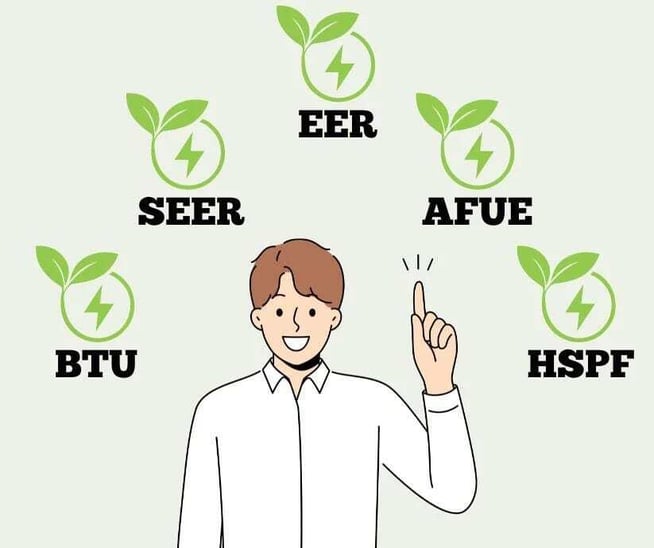Understanding the various efficiency ratings for heating and cooling systems is important in making informed decisions when it comes to home comfort. These ratings help you compare different systems based on performance level, comfort level, and utility savings. This blog will explain the key efficiency ratings: SEER, EER, AFUE, and HSPF.

BTU (British Thermal Unit)
What is BTU?
The British Thermal Unit (BTU) is a measure of heat energy. It’s used to quantify the amount of heat that a heating or cooling system can produce per hour. One BTU is the amount of energy needed to raise the temperature of one pound of water by one degree Fahrenheit.
Why is BTU important?
-
Sizing systems: BTU ratings help determine the size of the heating or cooling system needed for a particular space. Undersized units will struggle to maintain comfort, while oversized units can lead to inefficiency and discomfort.
-
Comparing output: BTUs allow you to compare the heating or cooling capacity of different systems easily.
-
Energy efficiency: Knowing the BTU rating in conjunction with SEER, EER, AFUE, and HSPF helps evaluate a system’s overall efficiency and suitability for your needs.
Choosing the right BTU rating
To select the appropriate BTU rating for your heating or cooling system, consider the size of the area you need to condition, the climate of your region, and the insulation of your home. Professional HVAC technicians can perform a load calculation to determine the exact BTU requirements.
SEER (Seasonal Energy Efficiency Ratio)
What is SEER?
The Seasonal Energy Efficiency Ratio (SEER) measures the cooling efficiency of air conditioners and heat pumps over an entire cooling season. It's calculated by dividing the cooling output (in BTUs) by the total electric energy input (in watt-hours) during the same period.
Why is SEER important?
-
Energy savings: Higher SEER ratings indicate more efficient units, which consume less electricity, leading to lower utility bills.
-
Environmental impact: Efficient systems reduce greenhouse gas emissions by consuming less energy.
-
Comfort: High SEER-rated systems often provide better temperature control and comfort levels.
Choosing the right SEER rating
While higher SEER ratings are better, they come at a higher upfront cost. Consider the climate of your location and your cooling needs. In warmer climates, a higher SEER rating might offer more significant savings over time.

EER (Energy Efficiency Ratio)
What is EER?
The Energy Efficiency Ratio (EER) measures the cooling efficiency of an air conditioner or heat pump at a specific temperature (usually 95°F). It's calculated by dividing the cooling output (in BTUs) by the electrical input (in watt-hours).
Why is EER important?
- Peak performance: EER provides a snapshot of the system's efficiency during peak cooling conditions.
- Comparative tool: It's useful for comparing the performance of different units under the same conditions.
- Supplement to SEER: While SEER gives a seasonal average, EER offers insight into performance during the hottest days.
Choosing the right EER rating
When selecting a system, consider both SEER and EER ratings. A high EER is particularly valuable in regions with very hot summers, ensuring efficient performance during the most demanding conditions.
AFUE (Annual Fuel Utilization Efficiency)
What is AFUE?
The Annual Fuel Utilization Efficiency (AFUE) measures the efficiency of furnaces and boilers. It's expressed as a percentage, representing the ratio of useful heat output to the total energy input. For example, an AFUE of 90% means 90% of the energy in the fuel becomes heat for the home, while the remaining 10% is lost.
Why is AFUE important?
- Fuel savings: Higher AFUE ratings mean more efficient fuel use, reducing heating costs.
- Environmental impact: Efficient heaters produce fewer emissions, contributing to better air quality and less environmental impact.
- Regulatory compliance: Many regions have minimum AFUE requirements for new heating systems.
Choosing the right AFUE rating
Opt for a furnace or boiler with a high AFUE rating, especially in colder climates where heating demands are significant. Although high-AFUE systems might be more expensive upfront, they offer long-term savings on fuel costs.
HSPF (Heating Seasonal Performance Factor)
What is HSPF?
The Heating Seasonal Performance Factor (HSPF) measures the heating efficiency of heat pumps over an entire heating season. It's calculated by dividing the total heating output (in BTUs) by the total electricity consumed (in watt-hours) during the same period.
Why is HSPF Important?
- Heating efficiency: Higher HSPF ratings indicate more efficient heat pumps, which can significantly reduce electricity consumption.
- Cost savings: Efficient heat pumps lower heating costs, making them a cost-effective option over time.
- Climate suitability: HSPF is particularly important in regions with moderate to cold winters.
Choosing the right HSPF rating
Select a heat pump with a high HSPF rating if you live in an area with substantial heating needs. Balance the initial cost with the potential energy savings to determine the most cost-effective option for your home.
Conclusion
Understanding BTU, SEER, EER, AFUE, and HSPF ratings is crucial for making informed decisions about heating and cooling systems. By choosing systems with higher efficiency ratings, you can enjoy lower energy bills, reduced environmental impact, and improved comfort in your home. When shopping for a new system, consider both the upfront costs and the long-term savings to find the best solution for your needs and climate.
If you live in the Delaware Valley/Greater Philadelphia area and would like to find comfort within your home, visit our website or give us a call at 215 - 245 - 3200 to learn more.




